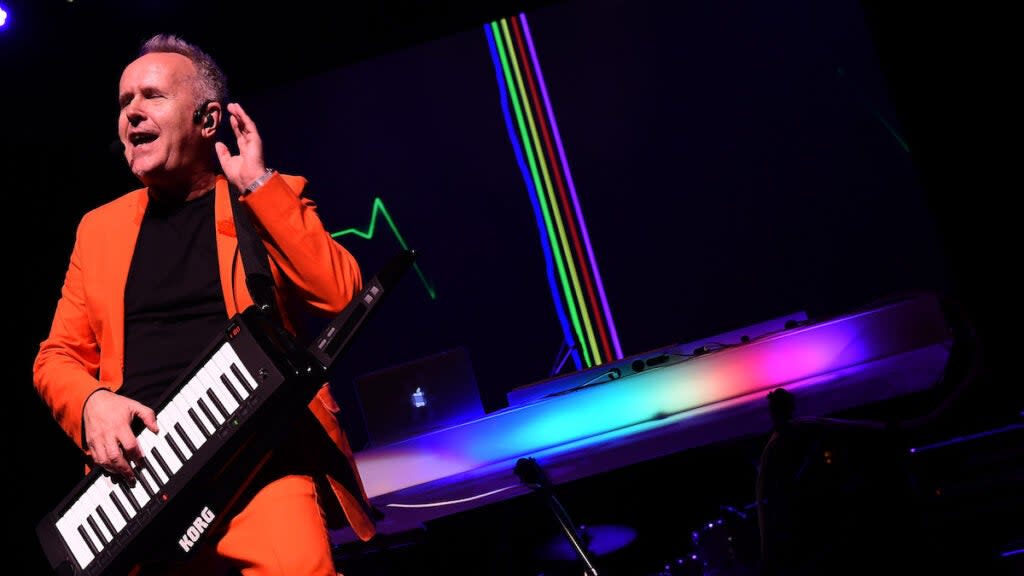No One’s to Blame for ChatGPT’s Made-Up ‘Facts’ About ’80s Synth-Pop Icon Howard Jones | PRO Insight

- Oops!Something went wrong.Please try again later.
- Oops!Something went wrong.Please try again later.
Am I hallucinating? Can it be that the increasingly off-the-rails Elon Musk actually called for discretion in tech?
Musk and a host of other prominent figures in AI have called for a six-month moratorium on further development of generative AI beyond GPT-4, the latest state-of-the-art model from ChatGPT maker OpenAI. Although that call stands little chance — OK, no chance! — of being heeded, it nonetheless is a welcome gut check to humanity before AI turns into a runaway train.
We’ve already seen ChatGPT proclaim its undying love to the New York Times’ columnist Kevin Roose, only to pull back like a jilted lover. If Musk is worried, then maybe we should be. Let’s not forget that he provided OpenAI, the company behind ChatGPT, with its initial funding, on top of attempting to deploy AI in Tesla cars. So he knows how the sentient sausage is made.
Also Read:
I Asked ChatGPT to Write a Movie, a TV Episode and a Country Song – Here’s What It Can and Can’t Do
Here’s my very own cautionary tale (and to be clear, I am no Luddite; I’ve run several tech-forward media companies). In my spare time, I host a music interview series on the Consequence podcast network called “The Story Behind the Song.” I interview iconic artists like Debbie Harry of Blondie about their most iconic songs, and also dig deep to uncover nuggets that haven’t been unearthed by all the interviews that have come before.
In that vein, last week I interviewed 1980s U.K. synth-pop singer Howard Jones of “No One Is to Blame” fame and, in advance of my interview, I did something a bit different. I reached out to our new artificially intelligent bestie, ChatGPT, to suggest some nonobvious factoids about the singer that I could spring on Jones to surprise my listeners. My specific text prompt was this: “Tell me 20 of the most surprising things that fans of singer Howard Jones don’t know about him.”
OpenAI’s artificial creation obliged of course — promptly and confidently. And its 20 answers were fascinating. Although I was downright incredulous about several of them, to a certain extent I couldn’t help but trust my little AI friend. After all, it could instantaneously crawl the entirety of human information on the Internet, where I was bound by human fingers that could barely hunt and peck. So I took its answers to my interview with some semblance of confidence for a new “true or false” segment with Jones. I selected five of ChatGPT’s asserted facts to ask Howard.
Also Read:
The Wacky, Unhinged Bing Chatbot Is Still Good for Microsoft’s Business | PRO Insight
The first surprising “fact” I asked for Jones to confirm was that he’s a pilot who has flown solo across the Atlantic. The singer chuckled, but demurred: No, he hadn’t. ChatGPT was beginning to sweat some artificial bullets at this point, but I persisted in my belief in its prowess. Question two was a lay-up. “True or false, Howard. You’ve designed your own line of synthesizers.” Now Jones’ chuckles were a bit more muted. He hit the buzzer. “No.” Wrong again! That one shocked me. ChatGPT’s answer made too much sense. How could it be wrong?
I did this a few more times, with my ChatGPT factoids in hand. “Howard, true or false. You’ve worked with NASA and composed music for the International Space Station.” “Mr. Jones, you’re a dedicated runner who has run several marathons, right?” False, false and one more false. Fascinating. And fascinatingly wrong. All five questions.
It’s easy to believe that computer-trained AI is immune to error. We generally blindly trust that technology always gets it right, even when there is no way to really know whether it is. We humans harbor a certain perception of tech perfection, especially when computer programs spit out such definitive answers. But certainly here, the hodgepodge of misinformation and amalgamation of too many musicians named Howard Jones simply overwhelmed my ChatGPT guru. If it had a physical form, no question there would be smoke billowing out of its ears.
Also Read:
Faced With the AI Revolution, the Entertainment Industry Can’t Pull a Napster | PRO Insight
Nonetheless, as I pointed out in last week’s column, AI is only stepping up to the plate now. It’s easy to laugh at generative AI’s obvious mistakes — the confabulations it came up with are a known, problematic phenomenon experts in the field call “hallucinations.”
But let’s not forget that OpenAI unleashed ChatGPT only four months ago. So you can’t really blame OpenAI’s young child for getting it so wrong when it’s just trying to take its first steps. And this little AI chatbot tot is tenacious and wily. It likes to be right, won’t stop until it is and will grow up faster than all of us think. Imagine next year. Five years from now. Ten. In the inimitable words of Howard Jones, “Things Can Only Get Better,” right?
Well, not so fast. There’s already a mass misinformation problem online. That will only accelerate as AI proliferates: We’ve already seen experiments in AI-powered media result in false information getting published. So we are right to be wary. For all of us here in the entertainment and creative community, maybe it’s time to join hands with Musk just this once as we together sing Howard Jones’ classic refrain: “Whoa! Whoa! Whoa-oh-oh-oh-oh.”
Or maybe just “Whoa!”
For those of you interested in learning more, visit Peter’s firm Creative Media at creativemedia.biz and follow him on Twitter @pcsathy.
Also Read:
This Story Was Not Written by a Robot: AI and the Future of News Media

